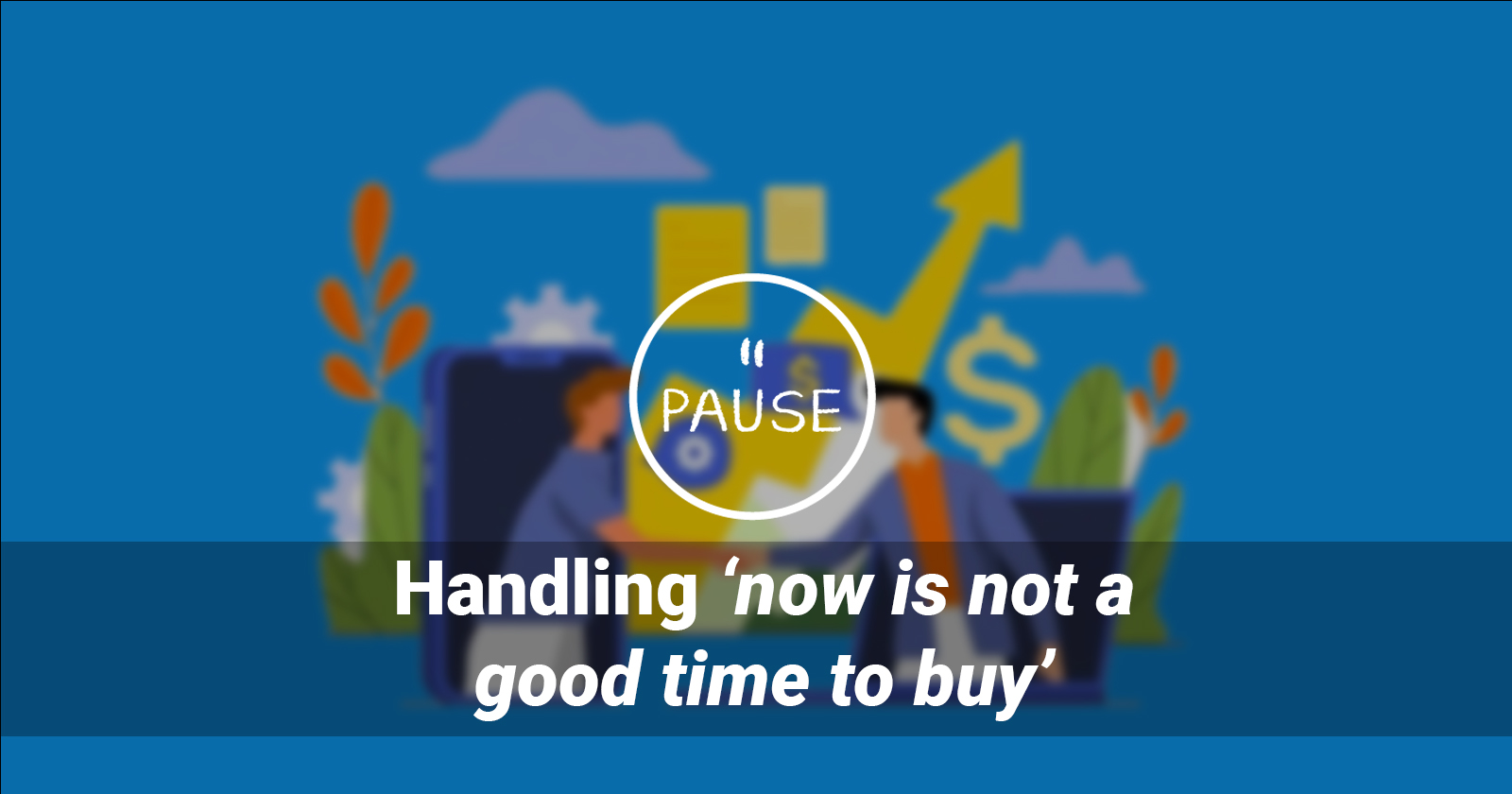
Oh how this phrase has sent shivers down the spines of many a salesperson.
It is that middle-of-nowhere territory where you are unsure if the client is stringing you along or if they genuinely need more time.
You are trying to figure out if you should continue to pursue or to give the client some breathing space.
You are second-guessing the client’s intentions…
‘Is he being nice but trying to tell me that he is not interested?’
‘Does he really need more time to consider or that now is not the right time?’
I am sure many of us have been stuck in this phase before.
Well, the pandemic has likely caused this to happen more times than usual, and it is real – the economic environment has taken such a shocking impact that timing and resources has become a true obstacle for many.
Regardless, we cannot just sit here and wallow in self-pity right?
So, how can we appropriately respond to combat timing objection issues? Or at least get to the heart of the client’s hesitations?
I was previously super sceptical about this. Like, how would a couple of responses or replies change the picture? So before I wrote this article, I did two things to quickly get a sense if this would be helpful and if anything, to convince myself this would be helpful.
1. I spoke to a colleague at Surer who focuses on user acquisition and some, he says, he intuitively / unknowingly uses, and some, actually does make sense to try!
2. I did a little bit of googling and a whole world of articles from pretty credible sources came up about the effectiveness of asking the right questions or ‘questioning techniques’. Harvard Business Review calls it ‘the surprising power of questions while even teachers use it to effectively gauge their student’s level of understanding of concepts.
So, here are some responses we picked out from our research that we thought might help General Insurance intermediaries!
‘Is it okay if you let me know your requirements and I will get you a quote – you can decide from there…’
This is where Surer can come in handy for General Insurance intermediaries.
We understand that sourcing for a quote can be a painful and tedious process. So, it is entirely understandable that an intermediary will not move to this step, unless they are pretty sure their clients are up for the purchase.
However, with Surer, intermediaries can save 95% of their time quote sourcing because we have streamlined and automated this process.
Intermediaries can now leverage Surer to not only close deals, but to serve their clients better, even at the prospecting stage.
Essentially, you can keep this client ‘warm’ because you have a reason to go back to the client with something concrete.
“If money were no object, would you be willing to give it a try?”
Okay, this might seem a little cliche, but as we looked back at our user acquisition journey thus far, we unknowingly do it to a certain level of success as well.
Typically, for intermediaries who told us ‘no’ to this question, we were able to at least follow up with a ‘why’ and get very good insights and feedback.
We then make it a point to act on the feedback, where it makes sense and fits into our broader product building goals.
Afterwhich, we go back to these intermediaries to see if Surer now serves their purpose.
Similarly for intermediaries, if your clients were to say ‘no’ to this question, do remember to ask why.
This then gives you the opportunity to relook your suite of products and get back to your client with something that might be of a better fit.
If your prospect says “yes,” it is an opportunity to dig deeper to discover what hurdles are standing in their way to determine whether or not you can accommodate.
“When would be a good time then?”
Maybe it is the truth that your client’s needs are not as immediate – that there are more pressing issues to attend to.
Asking this question can help you understand if there is still interest, and if so, you need to make sure to be top-of-mind when the time is actually really right.
Thanking them for their honesty and then asking for permission to send related content could be a nice way to continue engagement without being overly pushy.
Here at Surer, we kind of unwittingly achieved some level of success with this as well.
There were a couple of intermediaries we spoke to who said that they would give Surer a go when their next ‘case’ came up.
We asked if we could send them our blog articles and they were okay with it.
Sure enough a couple of users got in touch with us out of the blue and requested for another round of demo. They then immediately tried out Surer with the case they have on hand and…
CLOSED THE DEAL THROUGH SURER!
“What are your other priorities right now?”
One of the most common reasons for timing objections is pretty straightforward – your client might have other bigger priorities in his/her life or business.
If you are able to get a full picture, you might have the opportunity to then offer other ways of helping.
In the context of Insurance, it might be a chance for you to show empathy as well – to let your client know that you can continue servicing or advising him but he does not need to make a decision immediately.
For all you know, this also opens the door for you to offer other products that matches this priority.
Wearing the hat of a consumer looking at insurance, I might not always know what I want or need and so, will not spell it out to you in our discussions.
“If I call you back in X weeks, will anything change?”
In my asian mind, this question comes across as a little rude.
Do phrase this question in a way that suits your culture and context k?
But the point is to be able to suss out whether ‘timing’ is really the issue.
The idea, in asking this question is for you to understand what needs to change for the client to want to hear you out again.
A response to this question could go two ways…
One, could be a literal, ‘No. I am sorry.’
Of which gives you the clarity to move on.
OR, it could be the client elaborating to you what kind of situation will be ideal for you to approach him/her again – this is valuable because it not only shows you what is taking up your client’s mindspace but also the opportunity for you to show concern the next time you try to re-engage.
You never know, the client might share that he is working on his next venture which is why they are fully occupied; but with a new venture also comes a need for General Insurance… and that is the chance this question has created!
“Do you understand the value of X?”
According to our Surer colleague who has had 10 years of sales experience, no one has ever said ‘no’ to this question.
He would then usually follow up with his next question which is, ‘cool. Could you share which part of X works for you?’
This then allows your client to reiterate the initial goals they had, to even have this conversation with you.
Information like this can then help you understand the policies that you genuinely feel the client might need or if there is a tailored policy that could help him/her
If anything, their answers could also help flag out important miscommunication or incorrect assumptions you might have – for example, you have been focusing on explaining a policy that is of entirely no concern to the client.
“I had another client who was in a similar situation. They ultimately decided to purchase X because of Y….”
Not so much a question, but basically sharing of a case study.
If you feel like you have had a good grasp of your client’s situation and context, and based on experience, you think it is in their best interest to act sooner, then share why so.
For example, share your experience of how a client decided to go ahead with a certain policy and fortunately/unfortunately almost immediately had a claim to make.
Of course it is unethical to make up stories so, only do so if you have a genuine case to share.
—
While we are not a top producer or some super salesperson, we hope this article can either kickstart or remind you of all these that you might already know but somehow do not employ.
At the end of the day, we are living in unprecedented times… so while we continue to do what we have to do, remember that empathy goes a long way as well.
Having the technique to swing a situation to your advantage and employing the technique ethically are two different things okay? ✌🏻
Find out more about this topic at our upcoming webinar!
This topic will be one that will be covered in more details at our upcoming webinar. Find out more about the webinar or RSVP directly via the form below now!
Webinar Details
- Date: 2 July 2021, Friday
- Time: 10.30am – 12.30pm
- Venue: Zoom
This webinar is free and open to all insurance intermediaries who are interested in the topic, so please feel free to share this with your peers and network!
Are you an Insurance intermediary? Sign up for free now!
It is fuss-free. No credit card or payment required.
